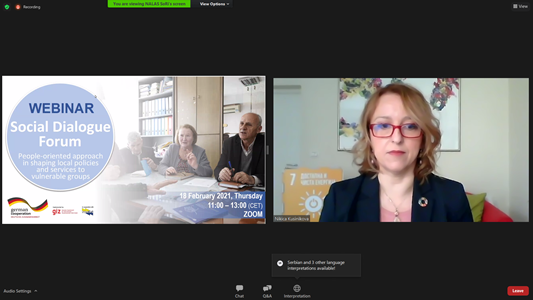
Based on the acknowledgment that the citizens, including the vulnerable groups, know best their problems and needs, the Social Dialogue Forum enables the local governments to properly identify and shape long-term solutions to social inclusion, alleviating poverty and reducing inequalities engaging with the communities it aims to serve.
During the webinar organised today, over 160 participants from around South-East Europe and beyond had the chance to learn more about what Social Dialogue Forum is, how it is to be organised and what are the benefits and challenges in its implementation. Also, the webinar provided the opportunity to exchange with practitioners who have already implemented this participatory approach and bore its fruits.
Ms. Kristina Hadzi-Vasileva provided the expertise on Social Dialogue Forum, focusing on what it is and how it should function. “Social Dialogue forum enables shifting from “command and control” to more informed joint goal setting for the benefit of all”, said Ms. Hadzi-Vasileva.

Mr. Nezir Huseini, from the NGO Sonce from Tetovo, North Macedonia, presented their experiences in using the Social Dialogue Forum for improving life of vulnerable citizens of Tetovo, emphasising the good cooperation with the Mayor and the City Council and the participation of all relevant institutions.

Mr. Artan Spahiu from the Albanian Centre for Integration of People with Special Needs, shared their experiences in cooperating with the Municipality of Elbasan in Albania for including and supporting people with special needs.

During the panel discussion, the panellists reflected on the main benefits from the Social Dialogue Forum, as well as the challenges they have faced, mostly related to maintaining high level of motivation and commitment of all stakeholders involved in the process. The spirit of cooperation and cohesion that has been developed during the implementation of the Social Dialogue Forum often spreads beyond the Forum and helps in solving other community issues, they concluded.

The participants of the webinar actively engaged in exchanging their views, knowledge and experiences. “I think that this excellently organised forum is very important for bringing closer local actors in creating functional partnerships and a constructive dialogue”, said one of the participants. “The fight against the prejudices that might exist among local actors might be one of the tasks for the future. Our state systems have functioned for years in a way that each system is a separate unit. That is why the dialogue is a challenge for the future, in a sense of improving its functionality for the benefit of citizens”.
“The key of all dialogues and agreements is horizontal and vertical connection of all participants in one process, mutual cooperation, trust and respect for the benefit of all citizens of the local community and contribution to achieving the long-term goals”, rightly pointed out another participant, and there is no better conclusion to our today’s topic.
We thank our moderator, Ms. Nikica Kusinikova and all participants for the great exchange all and we hope you join us for our next webinar on 4 March 2021, on Mobile Outreach Teams.
Materials from the webinar
 Social Dialogue Forum Concept – Krisitna Hadzi-Vasileva
Social Dialogue Forum Concept – Krisitna Hadzi-Vasileva
 Forum for Social Dialogue in Tetovo N Macedonia RDDA SONCE – Nezir Huseini
Forum for Social Dialogue in Tetovo N Macedonia RDDA SONCE – Nezir Huseini
 Albanian Center for Integration of People with Special Needs, Elbasan – Artan Spahiu
Albanian Center for Integration of People with Special Needs, Elbasan – Artan Spahiu
Video recording
This webinar is activity of the NALAS project “Enhancing local capacities to implement the 2030 Agenda and the Leave No One Behind Principle”, implemented by the associations of local authorities from the Western Balkans in cooperation with and supported by the regional project on “Social Rights for Vulnerable Groups”. The regional project is implemented by the Deutsche Gesellschaft für Internationale Zusammenarbeit (GIZ) on behalf of the Federal Ministry for Economic Cooperation and Development (BMZ).